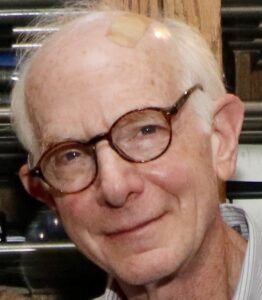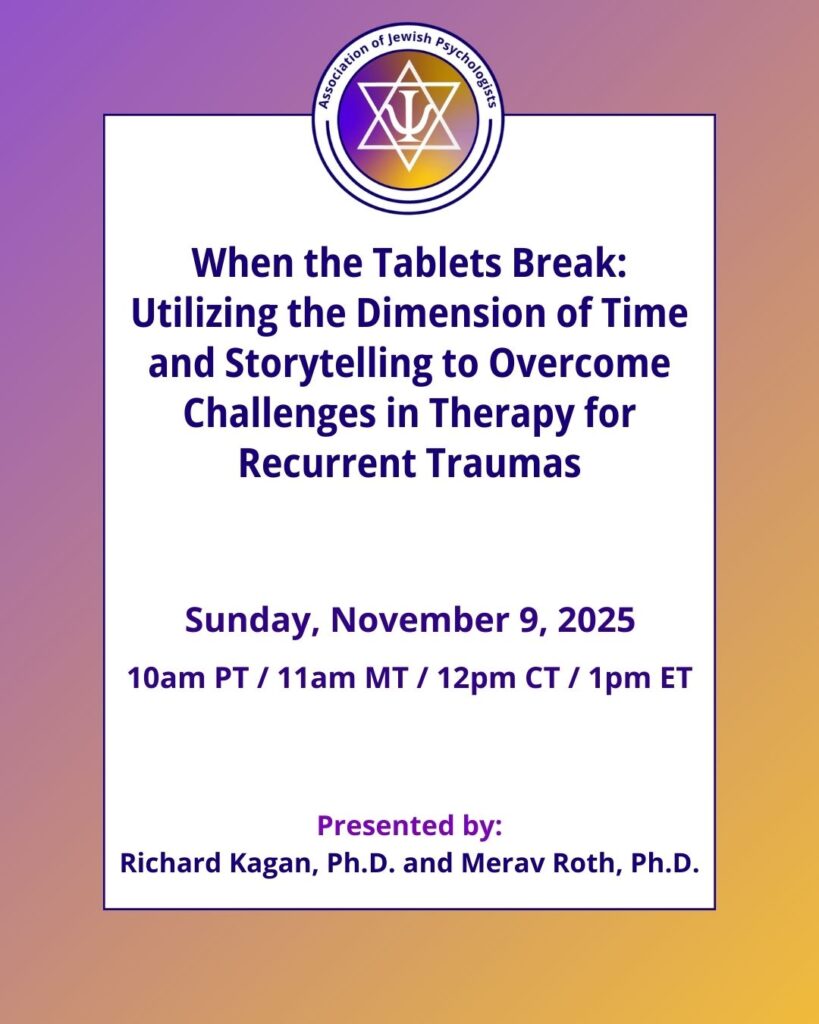This webinar is presented by Richard Kagan, Ph.D. and Merav Roth, Ph.D.
Date: Sunday, November 9, 2025
Time: 10 am PT / 11 am MT / 12 pm CT / 1 pm ET
Webinar length is approx 90 mins, ZOOM link will be sent a few days before the event.
Therapists frequently face the challenge of helping clients who have experienced multi-generational traumas including ongoing risk for themselves and their families. This workshop will describe challenges in trauma therapy when traumas are not ‘post’. Strategies utilizing the dimension of time and storytelling will be presented to help therapists engage highly stressed youths, families and adults who have experienced complex trauma. The workshop will include references from Judaism on healing and therapy with clients who experienced the October 7th massacres.
Learning Objectives
After completing this webinar, participants will be able to:
- Describe how perspectives of time can be used to help youths and adults move beyond the constriction often seen with traumatic stress
- Describe how storytelling can be used in trauma therapies to open up perspectives and reconnect children and parents/caregivers after experiences of traumatic stress.
- Describe how the ‘heroes journey’ is utilized in Real Life Heroes; Resiliency-focused Therapy to promote engagement, increase skills and develop a stronger identity

Richard Kagan, Ph.D., provides training and consultation on traumatic stress and complex trauma therapy and serves as a trainer for the Complex Trauma Treatment Initiative at Adelphi University’s Institute for Trauma Training and Treatment. He is the author of 12 books & 50+ articles, chapters & papers on practice and research issues in trauma therapy, child welfare, foster care, adoption, training implementation and quality improvement. Dr. Kagan’s books include the Real Life Heroes Life Storybook, the Real Life Heroes Toolkit for Treating Traumatic Stress in Children and Families, Rebuilding Attachments with Traumatized Children; Healing from Losses, Violence, Abuse, and Neglect, The Hero’s Mask novel, The Hero’s Mask Guidebook, and Wounded Angels; Inspiration from Children in Crisis. Dr. Kagan’s publications & training programs highlight resiliency-focused approaches to help therapists engage children, adolescents & parents/caregivers living with complex trauma and to help children and families rebuild attachments, strengthen resilience and reduce traumatic stress. Further information about Dr. Kagan’s publications, training programs and professional experience can be found at www.reallifeheroes.net.

Merav Roth, Ph.D., is a clinical psychologist, a training and supervising psychoanalyst at the Israeli psychoanalytic association, and an interdisciplinary researcher of psychoanalysis and literature; An associate professor at the School of Therapy, Counseling and Human Development, University of Haifa; The former head of the “Psychoanalytic psychotherapy program”; Former chair of the Interdisciplinary psychoanalytic Doctoral unit; Former founder and chair of Melanie Klein’s advanced studies – all in the psychoanalytic psychotherapy program at the School of Medicine, Tel Aviv University; A leading figure in the Israeli mental health aid after October 7th massacre; Co-Founder and chair of FLM (First Line Med) - An Israeli civil pro-bono organization for long term therapy for the victims of the massacre – that was awarded by the IPA (International Psychoanalytic Association); The scientific editor of various translated books of Melanie Klein and her successors into Hebrew; Writer of many psychoanalytic papers and various books on psychoanalysis and culture, including her book https://www.amazon.com/Psychoanalytic-Perspective-Reading-Literature-Psychoanalysis/dp/1138391301 (Routledge, 2020). Has won the international psychoanalytic Sigourney award for “extraordinary interdisciplinary work on psychoanalysis and literature and pioneering psychoanalytic study and treatment of trauma”: https://www.sigourneyaward.org/recipientlist/2024/11/11/merav-roth-phd-2024.
Utilizing the Dimension of Time and Storytelling to Overcome Challenges in Therapy for Recurrent Traumas
"*" indicates required fields



